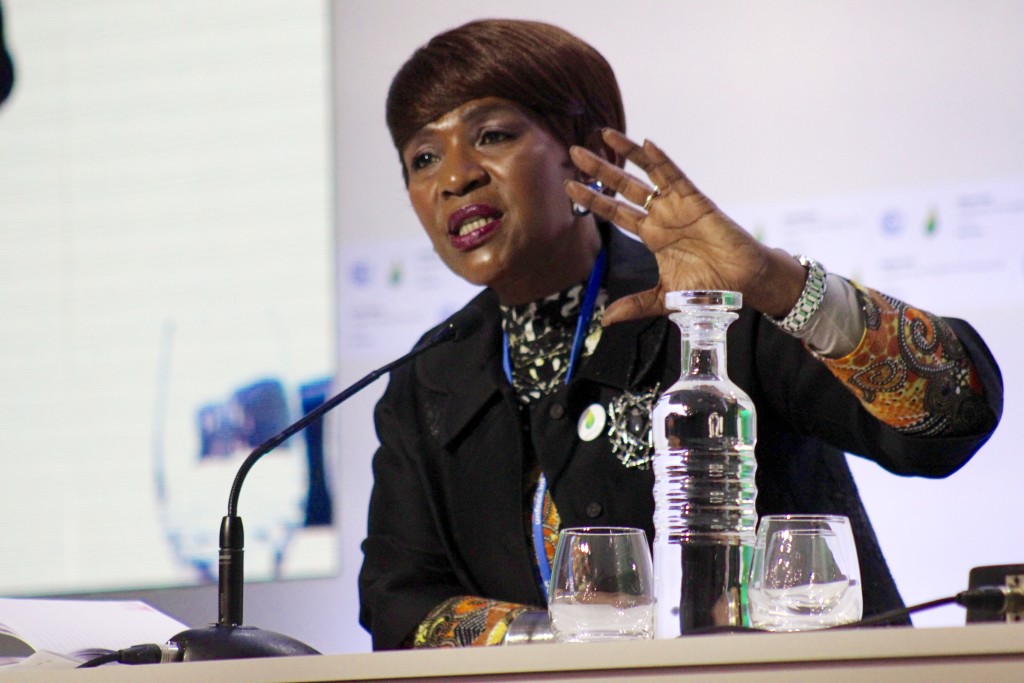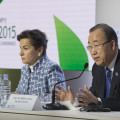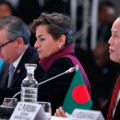Roadblocks to Climate Deal Appear Over Responsibilities and Finance
Andres Fuentes | December 4, 2015.
On Thursday, the third day of the Paris climate summit, the energy and optimism infused by the heads of state opening session was blunted by the reality that parties still have some major gaps to bridge.
The first sign of major disagreements emerged on Wednesday afternoon, with reports that the United States was proposing text that would challenge the concept of common but differentiated responsibility found in the Convention.
The proposed text reads as follows: “Parties in a position to do so, including developed country parties, should mobilize and provide support to developing countries that may need it.” This prompted a strong statement from the chair of the G77+China, ambassador Nozipho Mxakato-Diseko of South Africa, who pointed out that climate finance is not about charity, but about reparations for damage already caused and damage that is likely to occur. 
“Under the Convention, developed countries are obliged to provide financial resources….This is a legal obligation under the Convention. It is neither ‘aid’ nor ‘charity’, nor is it the same as development assistance. Finance support from developed countries relates to the impacts of historical emissions, which will only get worse with time for developing countries,” Mxakato-Diseko said.
She went on to register the G77+China’s concern about “the introduction of new language, which has no basis in the Convention, such as ‘Parties in a position to do so’ and ‘dynamism’ that do no take into account responsibility for historical emissions.”
On Thursday it became apparent that more red lines were being tested by the negotiations.
“We are not foreseeing an outcome in Paris without loss and damage. That is a red line for us.”
The Least Developed Countries (LDCs) held a press conference, where they spoke of loss and damage as a red line they were not willing to cross and the need for a maximum 1.5°C of warming.
Gambian environment minister, Pa Ousman Jarju, made it very clear that for there to be an agreement, it would need to deliver on both.
“We are not foreseeing an outcome in Paris without loss and damage. That is a red line for us. It might be a red line for others. In whatever compromise we are going to make at the end of this COP, if loss and damage is not addressed adequately there will be no outcome in Paris,” said Jarju.
Jarju argues that “1.5 is critical for the LDCs and for the SIDS, it’s a matter of survival. For us there is no way that we can have an agreement that doesn’t take into consideration the 1.5 degree issue.”
The LDCs are also looking for a legally binding agreement that encompasses the full Durban Platform negotiations, a position that may put them into conflict with the US, which has to balance a fine line on what can be legally binding to avoid needing a ratification vote in the US Senate.
“We are calling for a legally binding agreement, and of course that would include all of the five pillars of the Durban platform — mitigation, adaptation, finance, capacity building, technology transfer, and loss and damage,” said Jarju.
The G77+China also had a press conference that focused on their concern with what was happening in the finance negotiations and the issue of differentiation.
“We are calling for a legally binding agreement.”
Mxakato-Diseko, started off by saying that the unity of the G77+China was not to be feared, instead it was something needed since a fractured group would make it harder to manage the negotiations. Her focus then turned to how a “particular group of countries that midstream, between Durban and now, wants to change the mandate that we got in Durban.”
Mxakato-Diseko explained the problem with the US proposed additions in the finance text by relating it to chores in her household.
“In my family with the children I tell them, you will clean. So and so you will clean the room, I cannot say that someone will clean the room. I say you John will clean the room; you Grace will do the dishes. There is no someone [sic] in a position to do so will wipe the floor. I need accountability and I need to know above all that the floor has been cleaned,” she recounted.
The new wording is not the only issue in the finance stream of negotiations. The G77+China took issue with the OECD report on climate finance released on Monday.
“We are not responsible for what is happening.”
According to Mxakato-Diseko, they were not party to the report or even aware that countries had asked for it. They instead had been asking for work to be done on this from the standing committee on finance, which is under the convention, and had been refused. The way the report was done, she said, creates conditions that do not enhance trust in the negotiations.
Shared by both the G77+China and LDCs, an additional concern about the OECD report is that loans should not be part of the money counted as finance for climate change.
“We can not take loans to pay for climate change and treat it as climate finance. For us it needs to be grant-based finance, because we are not responsible for what is happening,” said Jarju.
For all the talk of action, one of the real sticking points in negotiations appears to be over who is going to pay to clean up the mess.









![Secretary-General Ban Ki-moon meets with Leaders from Small Island Developing States
[Secretary-General’s Conference room, Le Bourget]
- H.E. Mr. Anote Tong, President of Kiribati
- H.E. Mr. Christopher J. Loeak, President of Marshall Islands
- H.E. Mr. Freundel Stuart, Prime Minister of Barbados
- H.E. Mr. Kenny Davis Anthony, Prime Minister of Saint Lucia
- H.E. Mr. Enele Sosene Sopoaga, Prime Minister of Tuvalu](https://theverb.org/wp-content/uploads/2015/12/SG-Travel2-e1449660252704-120x120.jpg)



comment